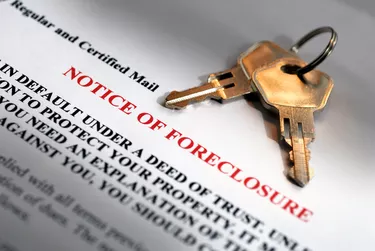
A foreclosure deed is a legal document granting ownership of property to the purchaser at a foreclosure sale. Depending on the type of foreclosure followed, a foreclosure deed may be a sheriff's deed or a trustee's deed. The effect of a foreclosure deed is to transfer legal title of property to a new owner.
Deeds
Video of the Day
A deed is a legal document that provides written proof of the legal ownership of real estate. The person named as the grantee on the deed is the current record owner of real estate. Basically, a deed is paper title to property. A deed transfers title to the grantee.
Video of the Day
Judicial Foreclosure
About half of the states in the United States only allow mortgage lenders to foreclose by judicial foreclosure. This process involves filing a lawsuit and appearing before a state court judge. The judge issues a foreclosure order directing the sheriff's department to hold a foreclosure sale. After the sale, the sheriff's department issues a sheriff's deed to the purchaser of the property.
Other Foreclosure
About half of the states in the United States allow mortgage lenders to foreclose non-judicially, sometimes also called foreclosure by power of sale. This foreclosure procedure does not require filing a lawsuit, nor does it require involving a state court judge at all. Instead, the mortgage lender hires a person or company called a trustee, which typically is a title company or an attorney, to hold a publicly noticed foreclosure sale. After the sale, the trustee issues a trustee's deed naming the purchaser at the sale as the new record owner of the property.
Deed Priority
Real estate title is subject to many claims of ownership or encumbrances. For example, when a mortgage lender issues a mortgage loan, the lender requires a mortgage lien on the property. Every lien or claim to the property is ranked according to its priority rights. The purchaser at a foreclosure sale receives a sheriff's deed or a trustee's deed granting ownership, but not necessarily granting senior priority in the property. The foreclosure deed still may be subject to liens that were superior to the mortgage lien being foreclosed on. For example, if a second mortgage lender holds a foreclosure sale, the person who purchases the property at that sale purchases the property subject to the first mortgage lien, which was and remains superior to the second mortgage lien.